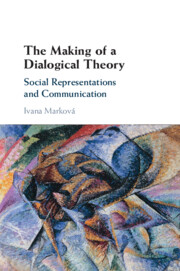Book contents
- The Making of a Dialogical Theory
- The Making of a Dialogical Theory
- Copyright page
- Contents
- Figures
- Acknowledgements
- Introduction
- Part I The Development and Diversification of the Theory of Social Representations and Communication
- Chapter 1 Socio-political Sources of the Theory of Social Representations
- Chapter 2 A Political Refugee in Paris
- Chapter 3 The ‘Age of Intellectual Innocence’ in Psychoanalysis (1961)
- Chapter 4 The Durkheimian in Psychoanalysis (1976)
- Chapter 5 The ‘Great Smoky Dragon’
- Chapter 6 Pseudo-dialogues and Building Bridges
- Part II The Dialogical Perspective of the Theory of Social Representations and Communication
- Afterword
- References
- Index
Chapter 3 - The ‘Age of Intellectual Innocence’ in Psychoanalysis (1961)
from Part I - The Development and Diversification of the Theory of Social Representations and Communication
Published online by Cambridge University Press: 22 June 2023
- The Making of a Dialogical Theory
- The Making of a Dialogical Theory
- Copyright page
- Contents
- Figures
- Acknowledgements
- Introduction
- Part I The Development and Diversification of the Theory of Social Representations and Communication
- Chapter 1 Socio-political Sources of the Theory of Social Representations
- Chapter 2 A Political Refugee in Paris
- Chapter 3 The ‘Age of Intellectual Innocence’ in Psychoanalysis (1961)
- Chapter 4 The Durkheimian in Psychoanalysis (1976)
- Chapter 5 The ‘Great Smoky Dragon’
- Chapter 6 Pseudo-dialogues and Building Bridges
- Part II The Dialogical Perspective of the Theory of Social Representations and Communication
- Afterword
- References
- Index
Summary
3. Moscovici’s intellectual ‘age of innocence’ was also the age of uncertainties. Aware that his work did not fit into the current trends in social psychology, he tried not to overstep the expectations of his political and intellectual masters. After all, he was a ‘réfugié et apatride’ (refugee and stateless) until 1958 (Moscovici, 2019, p. 299). This, to my mind, may explain why he hesitated in adopting the idea of ‘cognitive polyphasia’, although throughout the whole of Psychoanalysis, he constantly referred to multifaceted forms of thinking and language.
In contrast to the generally adopted belief that Moscovici’s ancestor in the theory of social representations was Emile Durkheim, there is no evidence of that in the first edition of Psychoanalysis. Moscovici was aware of some of Durkheim’s work but his references to it were negligible.
Focusing on Moscovici’s historical, philosophical, and cultural resources, this chapter shows that, in his ‘age of intellectual innocence’, continental philosophy and anthropology, Marxism, and the psychology of Jean Piaget played a vital role in his development of the theory of social representations. I suggest that there is a remarkable similarity between Moscovici’s ideas and those of Ernst Cassirer, with whose work he was well acquainted.
- Type
- Chapter
- Information
- The Making of a Dialogical TheorySocial Representations and Communication, pp. 45 - 73Publisher: Cambridge University PressPrint publication year: 2023

